Unveiling the sweet truth, discover if the natural sugars in honey carry the same health implications as processed sugars.
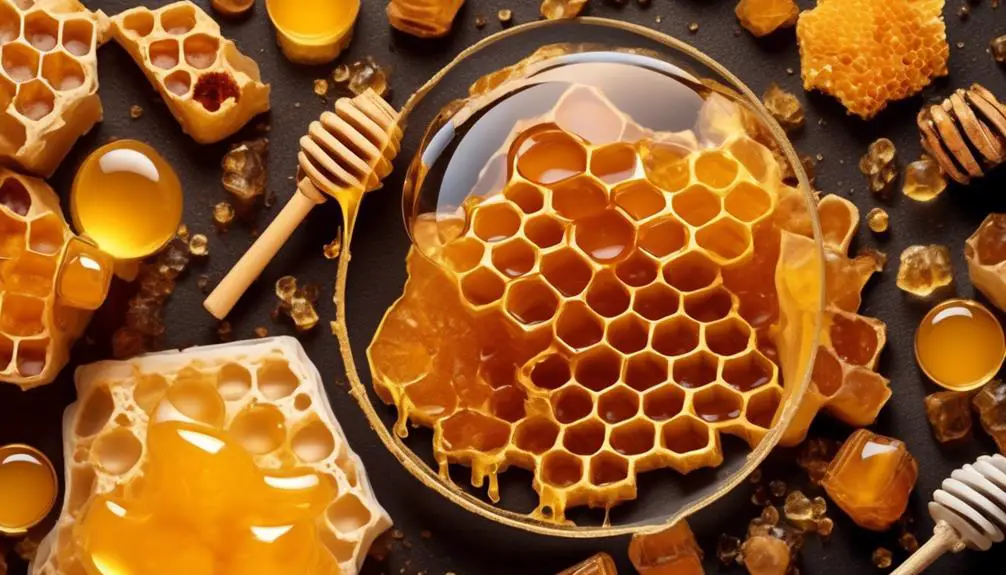
Are the Sugars in Honey Bad for You
Navigating the world of nutrition can be like traversing a dense forest, with each new path representing a different food or nutrient to investigate.
Today, you're standing at the crossroads of a sweet subject: the sugars in honey. It's no secret that honey, nature's golden nectar, is a source of sugars. But are these sugars detrimental to your health in the same way as those in processed foods? You might be surprised to learn that not all sugars are created equal.
However, before you start spooning honey into your tea, there's more to this sticky situation that's worth exploring.
Key Takeaways
- Honey is high in sugars, primarily fructose and glucose, and should be consumed in moderation to prevent health issues like obesity and heart disease.
- Compared to refined sugar, honey offers nutritional benefits such as minerals, antioxidants, and vitamins, but excessive consumption can still lead to weight gain and health problems.
- Honey has a lower glycemic index than refined sugar, causing a slower blood sugar spike, but monitoring overall sugar intake and balancing consumption is crucial for health.
- Despite its health benefits, honey is calorie and sugar-dense, with one tablespoon containing around 64 calories, so mindful consumption and adherence to recommended daily added sugar limits are important.
Understanding Sugars in Honey
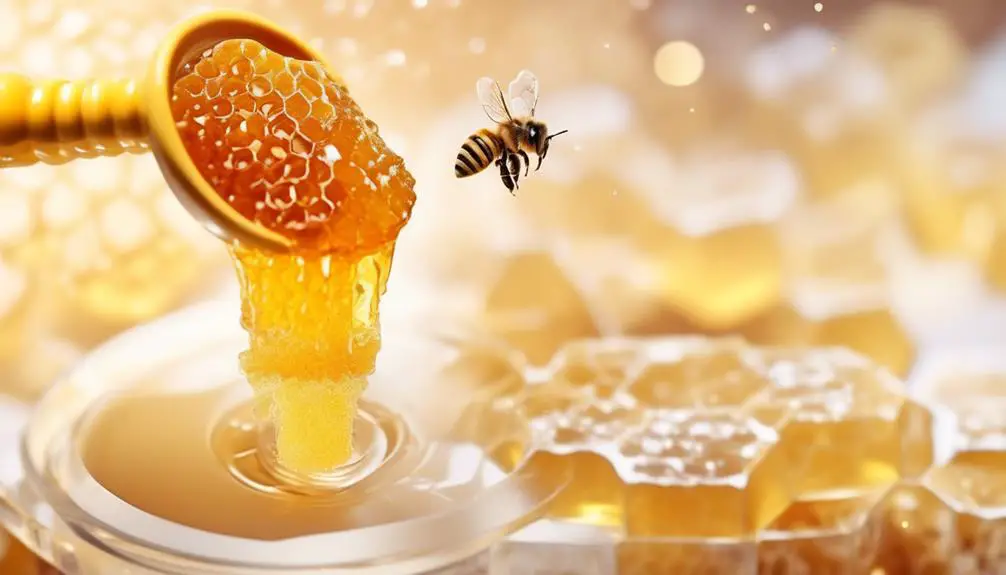
Despite its natural origins, honey is high in sugars, which can impact your health if consumed excessively. You might be wondering, 'Isn't honey a healthier choice than regular sugar?' In fact, honey does contain some nutrients and antioxidants that refined sugar lacks. However, it's important to understand the composition of honey to fully grasp the implications of its sugar content.
Honey is primarily made up of fructose and glucose, which are simple sugars. A tablespoon of honey contains approximately 17 grams of sugar. While the fructose gives honey its sweetness, it's also the very component that can contribute to health problems like obesity and heart disease when consumed in large quantities.
To put things into perspective, the American Heart Association recommends that men limit their intake of added sugars to 36 grams per day, and women to 25 grams per day. That means a single tablespoon of honey can put you close, if not over, your daily limit. So while honey is natural, it's still high in sugar and should be consumed in moderation to maintain optimal health.
Honey Vs. Refined Sugar
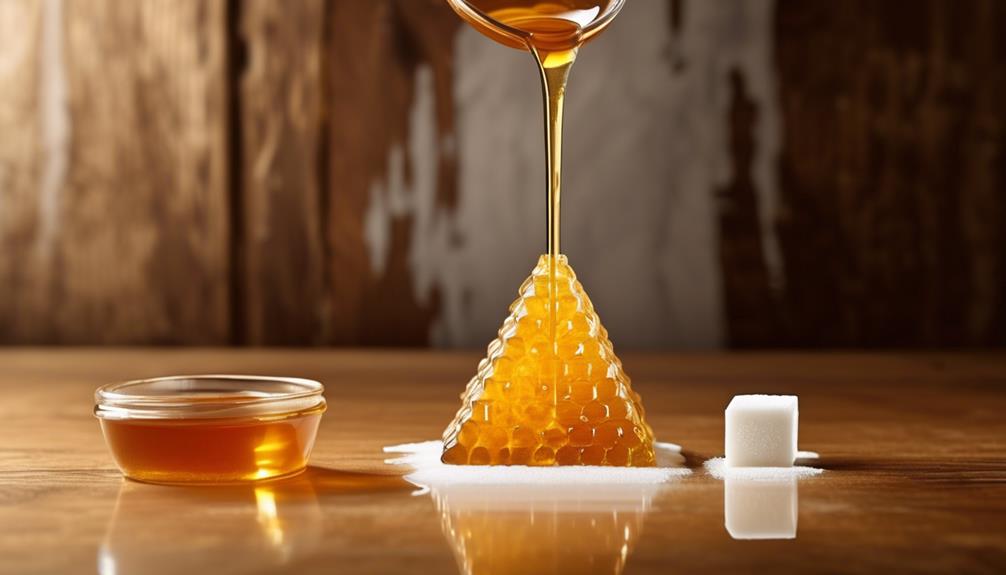
When comparing honey to refined sugar, it's important to note that they both have high sugar content, yet honey offers some nutritional benefits that refined sugar does not. While refined sugar is essentially empty calories, honey contains minerals, antioxidants, and vitamins. You'll find trace amounts of minerals like zinc and selenium, and vitamins such as vitamin B6, thiamin, and niacin in honey.
Furthermore, honey's sugar is naturally occurring, whereas refined sugar undergoes a chemical process during manufacturing. This processing strips away any potential nutritional content, leaving you with a product that can spike your blood sugar levels rapidly.
However, don't be fooled into thinking that honey is a free pass. It's still a form of sugar, and consuming it in large amounts can contribute to weight gain and other health issues. But if you're going to choose between honey and refined sugar, honey is the healthier choice. Its lower glycemic index means it doesn't raise your blood sugar as quickly.
In a nutshell, while honey is a slightly better choice than refined sugar, moderation is key. It's best used as a healthier substitute in cooking or to sweeten your tea, but always in small amounts.
The Glycemic Index of Honey
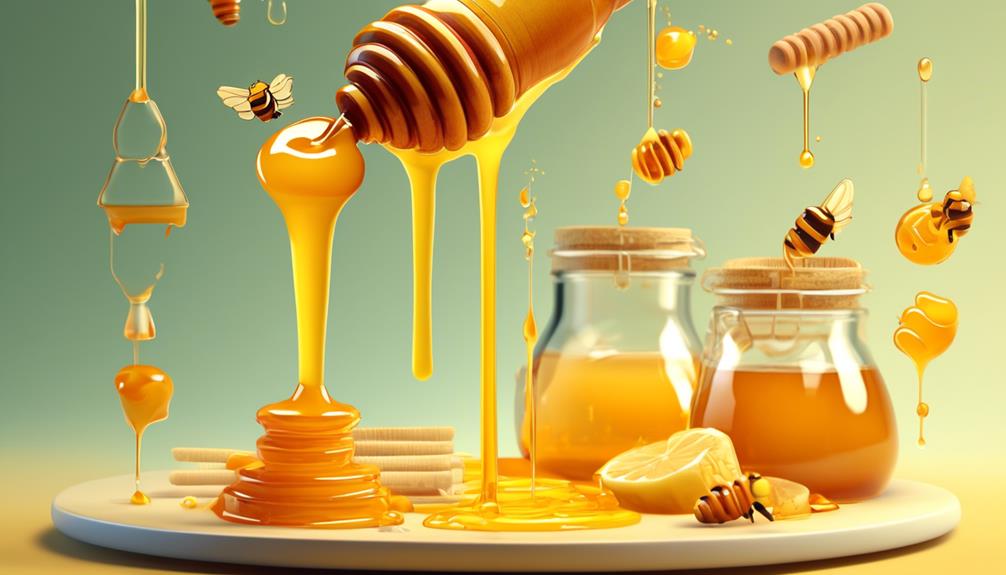
Building on the idea of honey's lower glycemic index, it's crucial to understand what this means and how it impacts your health. The glycemic index (GI) is a ranking of carbohydrates on a scale from 0 to 100 based on how they affect blood glucose levels. Foods with a high GI spike your blood sugar quickly, while those with a low GI raise it more gradually.
Honey has a GI of around 58, making it a medium-GI food. Compared to table sugar, which has a GI of around 65, honey's impact on your blood sugar levels is less severe. This doesn't mean you can consume honey without restraint, but it does suggest that honey might be a slightly better option than refined sugar.
However, remember that honey is still a form of sugar. Even if it has a lower GI, excessive consumption can contribute to health issues like obesity and heart disease. So, it's important to use honey judiciously, keeping your overall sugar intake within the recommended limits. In essence, the lower GI of honey offers a modest advantage, but it doesn't make honey a 'free' food.
Honey's Impact on Health

You might be wondering about the overall impact of honey on your health, given its sugar content and relatively moderate GI level. Here's the scoop. While honey does contain sugar, it also packs a nutritional punch that refined sugars can't match. It's rich in antioxidants, bioactive plant compounds that can protect your cells from damage and inflammation.
Research also suggests honey has prebiotic properties, meaning it nourishes the good bacteria that inhabit your gut. These bacteria play crucial roles in your health, influencing everything from digestion to immunity. Moreover, honey's sugar blend, which includes fructose and glucose, is absorbed into your bloodstream at a steadier pace than refined sugar. This helps prevent a blood sugar spike and subsequent crash, which can lead to fatigue and cravings.
But, remember moderation is key. Despite the health benefits, honey is still a dense source of calories and sugar. The American Heart Association recommends limiting added sugars, including honey, to no more than 100-150 calories per day. So, while honey's not 'bad' for you, it's best to consume it in balanced amounts.
Moderation and Honey Consumption
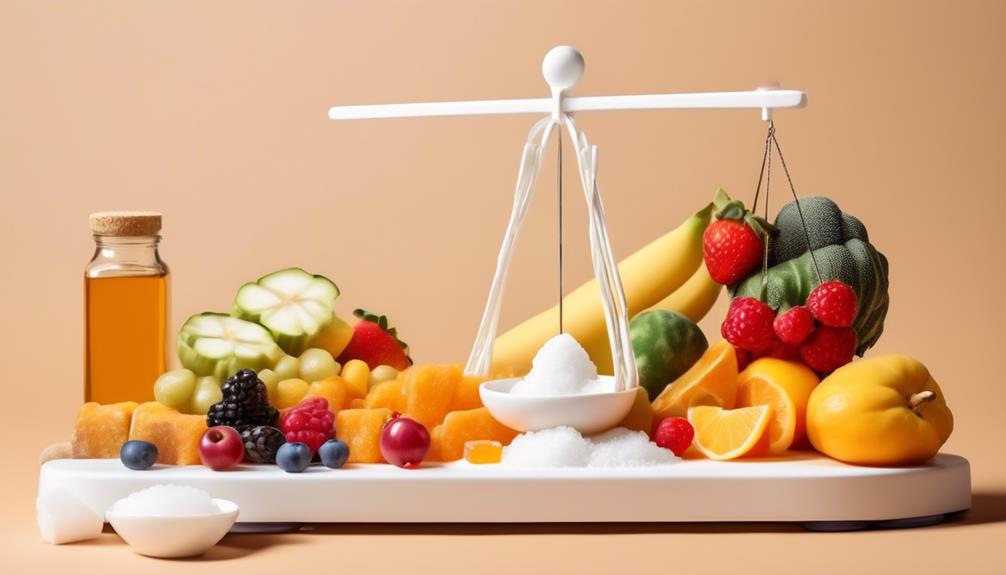
Balancing honey consumption is crucial, as it allows you to enjoy its health benefits without going overboard on sugar and calories. It's important to remember that even though honey is a natural sweetener, it's still high in sugar. One tablespoon contains around 64 calories, almost all of which come from sugar.
While honey does contain beneficial compounds like antioxidants, the sugar content can contribute to weight gain and other health problems if you're not careful. For example, consuming too much honey can lead to increased blood sugar levels, which is especially dangerous for those with diabetes.
The American Heart Association recommends limiting added sugars to no more than 100 calories per day for women and 150 calories per day for men. Considering honey's sugar content, it's easy to exceed these limits if you're not mindful.
Conclusion
In conclusion, honey does contain sugars, but they're not as harmful as those in refined sugar. Its lower glycemic index makes it a healthier choice.
However, remember that honey still impacts your health, potentially leading to weight gain if consumed excessively. So, enjoy the sweet perks of honey, but always in moderation.
Continue to make informed decisions about your diet to maintain a healthy lifestyle.



